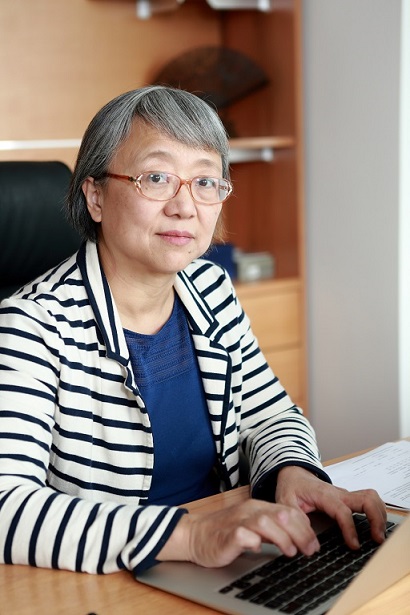袁鈞瑛,1958年出生於中國上海,分子生物學家,美國藝術與科學院院士、美國國家科學院院士,哈佛大學醫學院細胞生物學系終身教授,中國科學院生物與化學交叉研究中心主任。
1977年袁鈞瑛考入復旦大學生物系;1982年本科畢業後考入上海第一醫科大學研究生院,並通過CUSBMBEA項目赴美國哈佛大學醫學院攻讀博士學位;1989年獲哈佛大學神經學博士學位後進入麻省理工學院進行博士後研究;1990年受聘於哈佛大學醫學院,先後擔任助理教授、副教授、終生教授;2005年袁鈞瑛首次發現並定義了necropotosis這一細胞死亡模式;2007年入選美國藝術和科學院院士;2010年入選美國科學促進會會士;籌建中國科學院生物與化學交叉研究中心,並任主任;2017年當選為美國國家科學院院士。
袁鈞瑛主要從事於細胞死亡機制的研究,是世界細胞死亡研究領域的開拓者之一,世界上第一個細胞死亡基因的發現者。
基本介紹
- 中文名:袁鈞瑛
- 外文名:Junying Yuan
- 國籍:美國
- 民族:漢族
- 出生地:中國上海
- 出生日期:1958年10月3日
- 職業:教學科研工作者
- 畢業院校:哈佛大學
- 主要成就:2007年當選美國藝術和科學院院士
2010年當選美國科學促進會會士
2017年當選美國國家科學院院士 - 研究方向:細胞凋亡,細胞程式性壞死
人物經歷,主要成就,科學成就,人才培養,榮譽表彰,社會任職,個人生活,人物評價,
人物經歷
1977年,袁鈞瑛作為文化大革命後恢復高考後的第一批學生,以上海市應屆生高考理科第一名的成績考入復旦大學生物系,生物化學專業。
1982年,從復旦大學生物化學系畢業;同年考入上海第一醫科大學(現復旦大學醫學院)研究生院,並以優異成績通過中美聯合培養生物化學類研究生計畫(CUSBEA項目),成績在25000名學生中名列第二名,之後赴美國哈佛大學醫學院攻讀博士學位,師從羅伯特·霍維茨教授(2002年諾貝爾生理學或醫學獎)。
1989年,獲得哈佛大學神經學博士學位,同年進入麻省理工學院進行博士後研究。
1990年,進入哈佛大學醫學院任教,先後擔任助理教授(1990年-1996年)、副教授(1996年-2000年)、終生正教授(2000年-)。
2005年,受聘為第七批覆旦大學長江學者獎勵計畫講座教授,屬於學科生物化學與分子生物學。
2007年,入選美國藝術和科學院院士。2010年,入選美國科學促進會會士。
2012年,袁鈞瑛領銜組建了中國科學院生物與化學交叉研究中心並出任中心主任。
2014年,獲得哈佛大學Elizabeth D. Hay教授稱號。
2017年4月17日,袁鈞瑛教授以“發現細胞死亡的秘密”為題,為中國科學技術大學生命科學學院師生做“大師論壇”學術報告。5月,袁鈞瑛當選為美國國家科學院院士。
主要成就
科學成就
- 理論貢獻
袁鈞瑛實驗室第一次發現了調控線蟲細胞凋亡的基因,並證明了哺乳動物細胞和神經元中也存在與線蟲中功能類似的蛋白酶分子caspase介導哺乳動物細胞的凋亡;闡明了Bid蛋白是從死亡受體到線粒體這條誘導凋亡的通路中不可或缺的信號轉導分子;揭示了蛋白酶caspase-11是介導細胞在細菌脂多糖LPS刺激下活化caspase-1的重要分子;論證了半胱氨酸蛋白酶caspases在急性神經損傷和慢性神經退行中的作用。袁鈞瑛的發現開創性地用細胞凋亡的分子調控機制解釋了細胞自殺的現象。
2005年,袁鈞瑛在《Nat. Chem. Biol.》發表文章,闡述了小分子Nec-1對細胞壞死的調控作用,該文章在國際上首次將不受調控的壞死的概念(Necrosis)更新為可以被Nec-1調控的細胞程式性壞死(Necroptosis),程式性壞死在急性腦損傷、急性肝損傷、癌症、神經退行性疾病中都發揮重要的作用,該文章首次套用了化學生物學的方法研究了生物問題。
2008年,袁鈞瑛在《Nat. Chem. Biol.》發表文章,證明了RIPK1即為程式性壞死保護分子Nec-1的靶標,從而首次闡述了程式性壞死的調控基因。
2008年,袁鈞瑛在《Cell》上發表文章,用siRNA篩選的方法,證實基因組中很多基因對細胞程式性壞死都有調控作用,她用3年的時間,提出並解決了一個科學問題即細胞壞死是否被基因調控。運用小分子化合物的工具,袁教授實驗室發現了一種新的可被調控的細胞壞死方式,稱為程式性壞死。
2017年7月,袁鈞瑛課題組在期刊《Genes& Development》上發表題為“SPATA2 regulates the activation of RIPK1 by modulating linearubiquitination”的研究成果,揭示了SPATA2蛋白在調控細胞死亡中的重要作用。
- 學術論著
截止到2013年,袁鈞瑛的研究工作多發表在《科學》,《自然》,《細胞》等國際一流雜誌上,共148篇,多次被國際會議特邀做大會報告,也被諾貝爾獎委員會多次邀請做專題講座。
代表論文
1)Molecular mechanisms of apoptosis.
Miura, M., Zhu, H., Rotello, R., Hartwieg, E.A., and Yuan, J. (1993). Induction of apoptosis in fibroblasts by IL-1 beta-converting enzyme, a mammalian homolog of the C. elegans cell death gene ced-3. Cell 75, 653-660.
Gagliardini, V., Fernandez, P.A., Lee, R.K., Drexler, H.C., Rotello, R.J., Fishman, M.C., and Yuan, J. (1994). Prevention of vertebrate neuronal death by the crmA gene. Science 263, 826-828.
Li, H., Zhu, H., Xu, C.J., and Yuan, J. (1998). Cleavage of BID by caspase 8 mediates the mitochondrial damage in the Fas pathway of apoptosis. Cell 94, 491-501.
Wang, S., Miura, M., Jung, Y.K., Zhu, H., Li, E., and Yuan, J. (1998). Murine caspase-11, an ICE-interacting protease, is essential for the activation of ICE. Cell 92, 501-509.
2)The roles and mechanisms of apoptosis in neurodegeneration.
Friedlander, R.M., Gagliardini, V., Hara, H., Fink, K.B., Li, W., MacDonald, G., Fishman, M.C., Greenberg, A.H., Moskowitz, M.A., and Yuan, J. (1997). Expression of a dominant negative mutant of interleukin-1 beta converting enzyme in transgenic mice prevents neuronal cell death induced by trophic factor withdrawal and ischemic brain injury. J Exp Med 185, 933-940.
Sanchez, I., Xu, C.J., Juo, P., Kakizaka, A., Blenis, J., and Yuan, J. (1999). Caspase-8 is required for cell death induced by expanded polyglutamine repeats. Neuron 22, 623-633.
Nakagawa, T., Zhu, H., Morishima, N., Li, E., Xu, J., Yankner, B.A., and Yuan, J. (2000). Caspase-12 mediates endoplasmic-reticulum-specific apoptosis and cytotoxicity by amyloid-beta. Nature 403, 98-103.
3)Necroptosis, a regulated necrotic cell death pathway:
Degterev, A., Huang, Z., Boyce, M., Li, Y., Jagtap, P., Mizushima, N., Cuny, G.D., Mitchison, T.J., Moskowitz, M.A., and Yuan, J. (2005). Chemical inhibitor of nonapoptotic cell death with therapeutic potential for ischemic brain injury. Nat Chem Biol 1, 112-119.
Degterev, A., Hitomi, J., Germscheid, M., Ch'en, I.L., Korkina, O., Teng, X., Abbott, D., Cuny, G.D., Yuan, C., Wagner, G., Hedrick, S.M.,Gerber, S.A., Lugovskoy A & Yuan, J. (2008). Identification of RIP1 kinase as a specific cellular target of necrostatins. Nat Chem Biol 4, 313-321.
Hitomi, J., Christofferson, D.E., Ng, A., Yao, J., Degterev, A., Xavier, R.J., and Yuan, J. (2008). Identification of a molecular signaling network that regulates a cellular necrotic cell death pathway. Cell 135,1311-1323.
4)Regulation of autophagy in cancers and neurodegeneration.
Furuya, T., Kim, M., Lipinski, M., Li, J., Kim, D., Lu, T., Shen, Y., Rameh, L., Yankner, B., Tsai, L.H. & Yuan, J. (2010). Negative regulation of Vps34 by Cdk mediated phosphorylation. Mol Cell 38, 500-511.
Lipinski, M.M., Hoffman, G., Ng, A., Zhou, W., Py, B.F., Hsu, E., Liu, X., Eisenberg, J., Liu, J., Blenis, J., Xavier, R.J. & Yuan, J. (2010a). A genome-wide siRNA screen reveals multiple mTORC1 independent signaling pathways regulating autophagy under normal nutritional conditions. Dev Cell 18, 1041-1052.
Lipinski, M.M., Zheng, B., Lu, T., Yan, Z., Py, B.F., Ng, A., Xavier, R.J., Li, C., Yankner, B.A., Scherzer, C.R. & Yuan, J. (2010b). Genome-wide analysis reveals mechanisms modulating autophagy in normal brain aging and in Alzheimer's disease. Proc Natl Acad Sci U S A 107, 14164-14169.
5)Development of small molecule probes for studying cell death and neurodegeneration.
Degterev, A., Lugovskoy, A., Cardone, M., Mulley, B., Wagner, G., Mitchison, T., and Yuan, J. (2001). Identification of small-molecule inhibitors of interaction between the BH3 domain and Bcl-xL. Nat Cell Biol 3, 173-182.
Boyce, M., Bryant, K.F., Jousse, C., Long, K., Harding, H.P., Scheuner, D., Kaufman, R.J., Ma, D., Coen, D.M., Ron, D. & Yuan, J. (2005). A selective inhibitor of eIF2alpha dephosphorylation protects cells from ER stress. Science 307, 935-939.
Sanchez, I., Mahlke, C., and Yuan, J. (2003). Pivotal role of oligomerization in expanded polyglutamine neurodegenerative disorders. Nature 421, 373-379.
人才培養
1990年袁鈞瑛進入哈佛大學任教以後,培養了多名博士,並指導博士後的研究工作,2006年開始在中國科學院上海有機化學研究所擔任博士生導師,其中一些學生的具體信息如下:
| 姓名 | 類型 |
|---|---|
Louise Bergeron | Postdocs |
Vince Cryns | Postdocs |
Alexei Degterev | Postdocs |
Hannes Drexler | Postdocs |
Robert Friedlander | Postdocs |
Valeria Gagliardini | Postdocs |
Or Gozani | Postdocs |
Yongkeun Jung | Postdocs |
Minsu Kim | Postdocs |
Masuko Kobori | Postdocs |
Stephane Ledoux | Postdocs |
Honglin Li | Postdocs |
Ying Li | Postdocs |
Marta Lipinski | Postdocs |
Kai Long | Postdocs |
Masayuki Miura | Postdocs |
Nobuhiro Morishima | Postdocs |
Toshiyuki Nakagawa | Postdocs |
Helin Vakifametoglu Norberg | Postdocs |
Heling Pan | Postdocs |
Benedicte Py | Postdocs |
Rocco Rotello | Postdocs |
Ivelisse Sanchez | Postdocs |
Roberto Sanchez-Olea | Postdocs |
Sean Savitz | Postdocs |
Mamoru Shibata | Postdocs |
Yashuhito Terui | Postdocs |
Suyue Wang | Postdocs |
Jianhua Yao | Postdocs |
Lina Yoo | Postdocs |
Jidong Zhu | Postdocs |
Yasushi Ito | Postdocs |
Mike Boyce | Graduate Students |
Dana Christofferson | Graduate Students |
Pierre-Alain Fernandez | Graduate Students |
Shin Jung Kang | Graduate Students |
Philip Karuman | Graduate Students |
Juying Li | Graduate Students |
Dodzie Sogah | Graduate Students |
Lei Xu | Graduate Students |
Caroline Yi | Graduate Students |
榮譽表彰
1999年,SCBA傑出青年研究者獎。
2002年,乳腺癌研究創新獎。
2006年,國際細胞死亡協會獎。
2013年,安捷倫思想領袖獎。
2014年,獲得哈佛大學Elizabeth D. Hay教授稱號。
社會任職
| 任職時間 | 擔任職務 |
|---|---|
1990年 | 美國科學促進會會員 |
1997年 | 美國生化及分子生物學學會會員 |
1996-1998 | 《Current Biology》編輯委員 |
1998年 | 美國神經學會會員 |
1999年 | |
1999年 | 美國華人科學家協會會員 |
1999-2004 | 《Genes to Cells》副主編 |
1999-2002 | 《Journal of Cell Biology》編輯委員 |
2000-2004 | 《Journal of Neuroscience》審稿編輯 |
2002-2004 | 《Cell Death and Differentiation》接受編輯 |
2003-2016 | 《Journal of Cell Biology》高級編輯 |
2007年 | 美國藝術和科學院院士 |
2010年 | |
2010年至今 | 《Cell Death & Diseases》編輯委員 |
2017年至今 | 《Journal of Cell Biology》編輯委員 |
2017年 | 美國國家科學院院士 |
此外,袁鈞瑛還擔任Bristol-Myers Squibb,Pfizer,GlaxoSmithKline,Aventis,Merck,Millennium,Amgen等眾多國際藥物公司的諮詢專家。她還受聘為上海復旦大學、中國科學院上海有機化學研究所、中國科學院藥物研究所、中國醫學科學院、中國協和醫科大學和西安第四軍醫大學名譽教授,以及中國科學院外藉顧問。
個人生活
人物評價
袁鈞瑛是國際學術界公認的細胞死亡研究領域裡的權威,是世界細胞死亡研究領域的開拓者之一,是世界上第一個細胞死亡基因的發現者,該發現為世界細胞凋亡研究領域奠定了研究基礎。(國際細胞死亡協會評)

